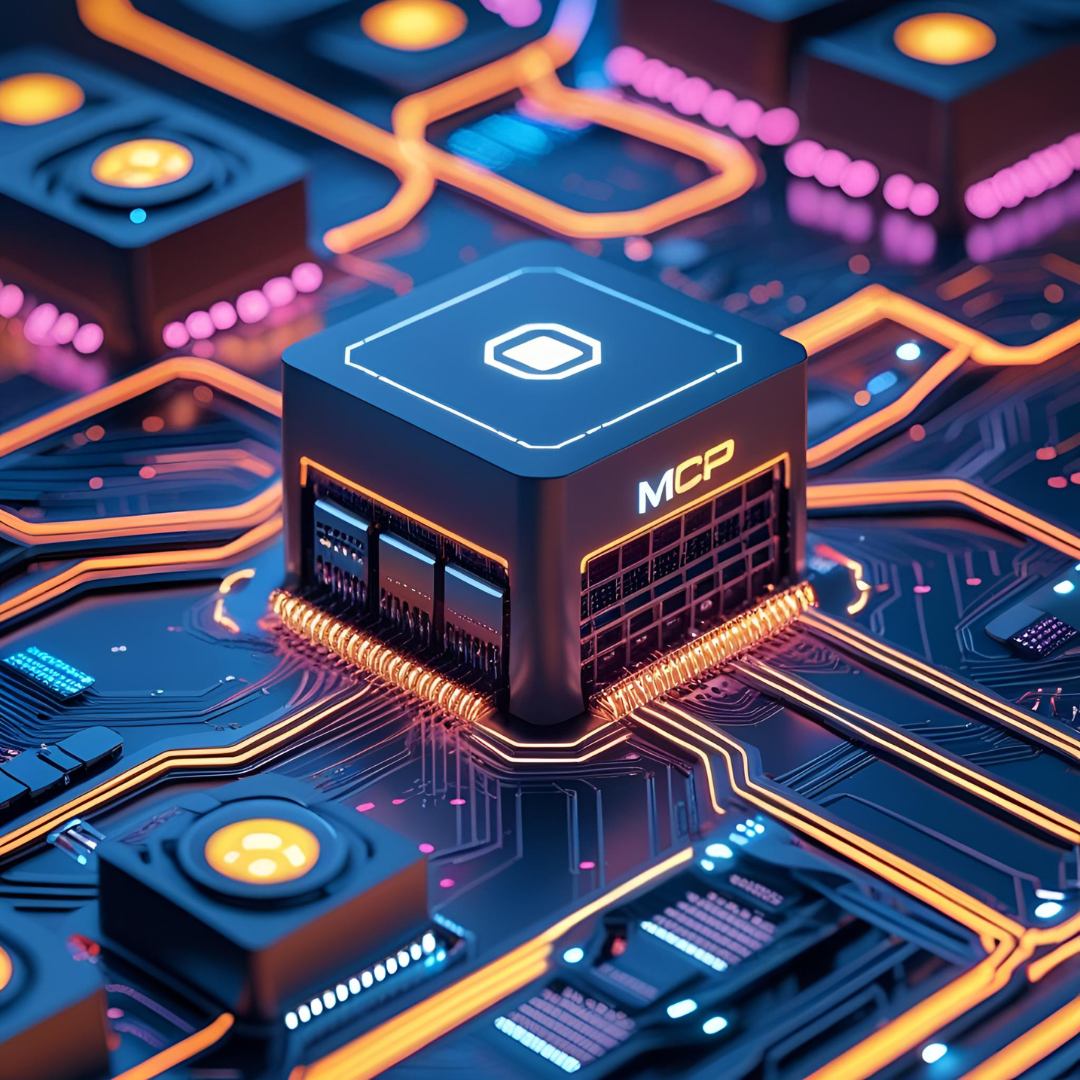The Huge Change MCP Servers Can Bring to Small and Medium Businesses
Discover how MCP servers can transform your existing CRM, ERP, and business platforms into intelligent assistants that answer your business questions naturally.
Hello there, sea lovers, business people, and just curious folks. The world is moving fast, especially the changes in the AI field. In my opinion, connecting existing tools in new ways together with AI can bring very high value to all business owners. Today we'll talk about MCP (Model Context Protocol) servers and how they can help businesses get current and relevant business knowledge in real-time.
Picture this: You're running a cool meat store that sells vacuum-packed meat somewhere in Tel Aviv, and instead of digging through Excel files or through weird interfaces of various systems you work with, you simply ask your AI assistant, "What's our best-selling product this month?" or "Which cuts are running low?" The AI connects to your existing Monday.com, CRM, or ERP system through an MCP server and gives you intelligent, contextual answers. With the new MCP capabilities, you can get huge value from your existing systems without the complexity of traditional business intelligence tools.
 From data chaos to clear insights: MCP servers bridge the gap between your existing systems and AI intelligence.
From data chaos to clear insights: MCP servers bridge the gap between your existing systems and AI intelligence.
What Are MCP Servers and Why Should You Care?
I get to see and meet all kinds of businesses, and it happens quite often that businesses drown in data while starving for practical insights. MCP servers are like a USB connection between the artificial intelligence model and your system—they bridge between your smart assistant (ChatGPT, Claude, Gemini, etc.) and your existing business systems, creating a bridge that changes how you interact with your data.
According to recent data from Gartner (2024), businesses using AI-powered business intelligence manage to achieve 40% faster decision-making and 25% improvement in operational efficiency. But most of these solutions require expensive enterprise software or complex integrations. MCP servers can lower the cost and help you harness this power.
The Treasure Map: How MCP Servers Work for Your Business
Let me share a real-world example. A Tel Aviv meat store owner named David was drowning in Excel spreadsheets, customer data in Monday.com, and sales reports in their POS (Point of Sale) system. He wanted simple answers: "What sells best on weekends?" "Which customers buy the most expensive cuts?" "When is the best time for me to order new ribeye inventory?"
The truth is that David was spending more time analyzing data than actually running his business. Sound familiar?
The Traditional Way (Before MCP)
- Export data from Monday.com
- Export data from POS system
- Combine in Excel
- Create pivot tables
- Generate charts
- Interpret results
- Time spent: 2-3 hours per question
The MCP Way
- Ask: "What sells best on weekends?"
- AI connects to your systems via MCP
- Get instant, contextual answer
- Time spent: 30 seconds
That's not a typo. Thirty seconds versus three hours. David went from spending his mornings buried in spreadsheets to actually talking to customers and growing his business.
Real-World Applications: Your Business, Supercharged
1. Inventory Management: Never Get Stuck Without Knowing What's Best to Order
The Problem: Traditional inventory management is reactive—you discover shortages when it's too late.
The Solution: Simply ask the model "Which products are running low and what's our reorder timeline?" The MCP server connects to your inventory system, analyzes historical data, and provides predictive insights.
Value Created: According to McKinsey (2024), AI-powered inventory optimization reduces stockouts by 30% and excess inventory by 25%, directly impacting your bottom line. That's real money saved, not just time.
2. Business Intelligence: Know Your Customers
The Problem: Customer data sits siloed across different systems—CRM, email marketing, POS, website analytics.
The MCP Solution: "Who are our most valuable customers and what do they buy?" The MCP server aggregates data from all sources, creating a unified customer view.
Value Created: Harvard Business Review (2024) reports that businesses with unified customer data see 23% higher customer lifetime value and 18% better retention rates. In plain English? You keep more customers and they spend more money with you.
3. Sales Performance
The Problem: Sales reports are backward-looking and don't provide actionable insights.
The MCP Solution: "What's driving our sales growth this quarter and what should we focus on next month?" The AI analyzes patterns across your sales data, identifying trends and opportunities.
Value Created: Businesses using AI for sales analytics see 15-20% revenue growth, according to Salesforce research (2024). That's not just a nice-to-have—it's survival in today's market.
Setting Sail: How to Implement MCP Servers
The beauty of MCP servers is their accessibility. You don't need a massive IT budget or technical expertise. Here's how to get started:
Now, I know what you're thinking: "This sounds too good to be true." But it's not. The setup is actually pretty straightforward.
Step 1: Choose Your Platform
Most MCP servers are open-source and can connect to popular business platforms:
- Monday.com: Already has MCP server support
- Salesforce: MCP integration available
- HubSpot: MCP server in development
- Custom ERP/CRM: Can be connected with simple API integration
Step 2: Set Up Your MCP Server
The setup is surprisingly simple. For Monday.com, for example:
# Install the Monday.com MCP server
npm install -g @monday/mcp-server
# Configure with your API key
monday-mcp --api-key YOUR_API_KEY
Step 3: Connect Your AI Assistant
Most modern AI tools (Claude, GPT, Cursor) support MCP servers. Once connected, you can ask natural language questions about your business data.
The Competitive Advantage: Why Act Now?
Here's what excites me most about this opportunity: timing. While enterprise companies are still debating AI strategies, small to medium businesses can implement MCP servers quickly and gain immediate competitive advantages.
The Numbers Don't Lie
- Implementation Time: 2-4 weeks vs. 6-12 months for traditional BI solutions
- Cost: $100-500/month vs. $10,000-50,000 for enterprise solutions
- ROI: 🤯 🤯 🤯
- Adoption Rate: 85% of employees use AI-powered insights vs. 15% for traditional dashboards
Let that sink in for a moment. You can get enterprise-level business intelligence quite easily.
Real Business Impact
It's reasonable to assume businesses can achieve:
- 40% reduction in time spent on reporting
- 25% improvement in decision-making speed
- 30% increase in customer satisfaction scores
- 20% growth in revenue through better insights
Charting Your Course: Getting Started
Ready to set sail toward AI-powered business intelligence? Here's your action plan:
Change can be scary, especially when it involves technology. But notice that you're not building this from scratch. You're just connecting what you already have in smarter ways.
Phase 1: Assessment (Week 1)
- Audit your current systems: What data do you have and where is it stored?
- Identify your biggest pain points: What questions do you wish you could answer quickly?
- Choose your first MCP server: Start with the platform you use most.
Phase 2: Implementation (Weeks 2-3)
- Set up your MCP server: Most can be configured in under an hour.
- Connect your AI assistant: Claude, GPT, or your preferred AI tool.
- Test with simple questions: Start with basic queries to build confidence.
Phase 3: Optimization (Week 4+)
- Expand your questions: Move from basic queries to strategic insights.
- Train your team: Show others how to use the system.
- Measure impact: Track time saved and decisions improved.
The Future Is Now: Why This Matters
In my humble opinion, businesses that adapt quickly to new technologies are the ones that survive and thrive. MCP servers represent a rare opportunity—a technology that's both powerful and accessible, capable of transforming how you run your business without requiring massive investments or technical expertise at the level of an R&D team.
The window of opportunity is open now. While your competitors are still figuring out how to use AI, you can be implementing it to solve real business problems. The question isn't whether you should adopt MCP servers—the question is how quickly you can get started.
And honestly? The longer you wait, the further behind you'll fall.
Dropping Anchor: Your Next Steps
Fellow business navigators, the seas of opportunity are calling. MCP servers aren't just another tech trend—they're a fundamental shift in how businesses interact with their data. The technology is here, and it's ready to transform your business.
Your mission, should you choose to accept it: Start with one question you've always wanted to answer about your business. Set up a simple MCP server connection. Ask that question in plain English. Experience the magic of getting an intelligent, contextual answer in seconds instead of hours.
That's it. One question. One setup. One moment of "wow, this actually works."
The future of business intelligence isn't about bigger dashboards or more complex reports. It's about asking questions naturally and getting intelligent answers instantly. MCP servers make this possible for businesses of any size.
 The future of business intelligence: Simple questions, powerful answers, confident decisions.
The future of business intelligence: Simple questions, powerful answers, confident decisions.